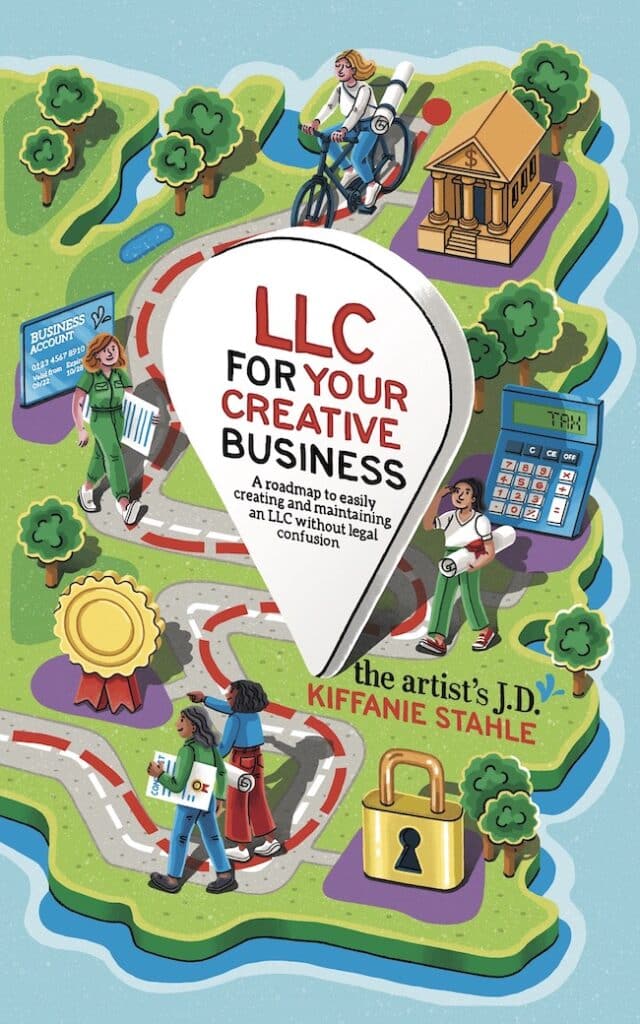This blog post contains affiliate links. (These can be spotted by the text [affiliate link] or an * placed after the link.) I use these links because the small commission I make allows me to keep creating intuitive, practical legal (and biz) resources. Plus it never changes the price you pay.
You might have started the year with big dreams—maybe launching new products, growing your audience, or even hiring help—but without a solid legal framework, those dreams can quickly hit unexpected roadblocks.
Luckily, every quarter brings a fresh opportunity to take charge of your creative business’s legal foundation. Q2 isn’t just another season—it’s another opportunity to ensure that your business stays protected, compliant, and ready to grow.
If you’ve been putting off legal check-ups because they seem overwhelming or boring, think of these tasks as essential maintenance—like scheduling an oil change before your car starts acting up. (Pssst… my favorite read on habit formation is The Power of Habit by Charles Duhigg [affiliate link].)
Below are five bite-sized Q2 legal tasks, each designed to take 15-30 minutes to complete. Tackling these tasks now will help you avoid costly headaches later and set you up for a solid, worry-free future.
Q2 Legal Task #1: Evaluate (and update) your email marketing template
Your marketing emails are more than just a way to connect with your audience—they’re legally required to include key elements:
- accurately identify your business with a valid name, from email address, and reply-to email address
- avoid deceptive subject lines
- include a valid postal mailing address (P.O. Boxes and Private Mail Boxes work too)
- provide clear instructions on how recipients can opt out
- honor opt-out requests promptly
Many email marketing platforms like MailChimp automatically handle these requirements (they even add your mailing address and unsubscribe link in every email). But it never hurts to double-check.
👉 Your Assignment: Open your current email template and confirm all these elements are present. Also, verify that the address you provided is a valid postal mailing address (this is the most common mistake I see in email marketing). A quick review now can save you from headaches later.
Q2 Legal Task #2: Update (or create) your website’s Terms of Service and Privacy Policy
Your website is always evolving—new features, updated content, and improved designs. With every change, your Terms of Service and Privacy Policy might need a refresh to stay current and compliant.
If you already have these documents, review them carefully to ensure they reflect your current operations.
If you don’t have them yet, consider using my Mad Libs-style template for a quick start or, for a version that truly matches your branding and voice, join the the artist’s Courtyard where a course is available on keeping your website legally up to date.
👉 Your Assignment: Read through your Terms of Service and Privacy Policy. Note any outdated information or missing updates, and make the necessary revisions.
Q2 Legal Task #3: Pay your taxes
Taxes are never fun, but they’re a fact of business life. Whether it’s estimated self-employment taxes, collected sales tax, or employer taxes, staying on top of your quarterly payments can prevent penalties and keep your financial house in order.
👉 Your Assignment: Check your quarterly tax deadlines and send your payments to the IRS or your state tax agency. If you’re struggling to manage cash flow for these payments, consider setting aside money with the system outlined in Profit First by Mike Michalowicz [affiliate link].
Q2 Legal Task #4: Audit sponsored/affiliate content for FTC compliance
When you promote products or services as part of sponsored content or affiliate marketing, you must follow FTC guidelines to ensure your audience knows you’re being compensated.
The FTC rules are pretty common sense when you think about them from the consumer’s standpoint. You need to make it clear that you are getting something in exchange for promoting the product or service.
And you do this by adding a notification to your content that the link an affiliate link. You might do this by:
- add the text [affiliate link] after any text or image link
- having a standard blurb that goes at the top of each sponsored or affiliate blog post
- add #ad to the beginning of any social media post
To follow the FTC rules, you need to meet all four of these requirements:
- Placement: You cannot hide the disclosure in the footer. It must be conspicuous and obvious.
- Action: You can’t require viewers to take extra steps to read the disclosure (e.g. no click-through links).
- Clear: Viewers must easily know that you are getting paid in exchange.
- Timing: You can’t just tell viewers once. Disclosures must be on every post, social media interaction, email, link, or comment.
(My trick to remembering these four elements is that you make a PACT with viewers to disclose when they are getting something in return.)
👉 Your Assignment: Review your website, blog posts, and social media content. Update any affiliate or sponsored content to ensure all disclosures are compliant. If you need help developing a standard disclosure policy, check out the resources available in the artist’s Courtyard.
Q2 Legal Task #5: If you’re an LLC or Corporation, document major business decisions
One of the key benefits of having an LLC or corporation is that it creates a legal separation between your personal and business assets. But to keep that protection intact, you must document all major business decisions—this means keeping thorough records of meetings, decisions, and any changes that affect your company’s direction.
Even if you’re a one-person show, jotting down these decisions (often called Minutes of a Meeting or Written Consents) is critical because it shows you are treating your business like a business.
👉 Your Assignment: Write down every major business decision you’ve made in Q1—be it hiring a new team member, signing a significant contract, or even rebranding efforts. Store these notes in your central business file. If you need a template to get started, check out LLC for Your Creative Business.
It can be overwhelming to know exactly what’s expected to keep your LLC on the legal up and up

Creating an LLC isn’t:
- as simple as shipping off a form
- a set-it-and-forget-it thing
- a magic bullet to prevent all liability
This book is designed to guide you step by step through the process of making sure your LLC fence remains strong–especially when you need it most.
(If you use the above Amazon affiliate link, we’ll make a small commission, but it doesn’t change the price you pay.)
TL;DR
In Q2, complete these five legal tasks to keep your creative business running smoothly:
- Email Marketing: Review and update your email template to include all required legal elements.
- Website Policies: Update or create your Terms of Service and Privacy Policy.
- Taxes: File your quarterly tax payments to avoid penalties.
- Sponsored/Affiliate Compliance: Audit your sponsored/affiliate content to ensure full FTC compliance.
- Documentation: If you’re an LLC or corporation, document all major business decisions.
Taking these steps might seem like a hassle, but a little proactive legal maintenance now will help protect your creative future. If you need more guidance or resources, remember that you’re not alone—there’s a wealth of support available in the artist’s Courtyard.

Hi! I’m Kiff! I’m your friendly legal eagle (and licensed attorney).
My goal is to add ease to the legalese. And because I think basic legal resources should be available to every creative, I create a lot of free content.
If I’ve created something that has helped inject a little ease into your creative business and you would like to say “thank you”, you can make a contribution here.
If you’d like to hear more from me, I’d love to pop into your inbox every Friday morning to share additional ways to cut through the red tape and inject a little ease.
Get tips from your friendly legal eagle in your inbox…
Your privacy is important to us. Learn how we protect it here.

